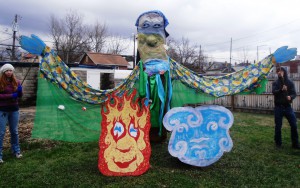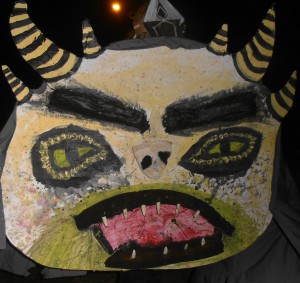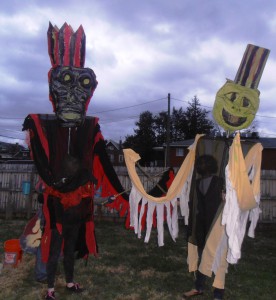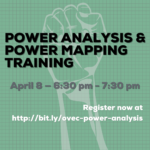 One year ago West Virginia experienced one of the worst and largest chemical spills in Appalachian history. More than 10,000 gallons of MCHM poured into and polluted our water, due to the apathy and greed of the chemical and coal barons that dominate our government and job opportunities. We as citizens and as human beings deserve to be angry and hurt about this tragedy – we need to be heard, we need to make some noise, and we need to make a lasting positive impact.
One year ago West Virginia experienced one of the worst and largest chemical spills in Appalachian history. More than 10,000 gallons of MCHM poured into and polluted our water, due to the apathy and greed of the chemical and coal barons that dominate our government and job opportunities. We as citizens and as human beings deserve to be angry and hurt about this tragedy – we need to be heard, we need to make some noise, and we need to make a lasting positive impact.
We, the Vandalia Collective, are local activists, truth seekers, performers, workers, whimsical spirits, hippies, punks, environmentalists, artists, and volunteers  (INCLUDING YOU!) based out of Huntington, WV. We seek to rise up and send a loud and clear message against audacious misuse of power and land that has been happening here in West Virginia far too long.
(INCLUDING YOU!) based out of Huntington, WV. We seek to rise up and send a loud and clear message against audacious misuse of power and land that has been happening here in West Virginia far too long.
We need your help!
We will be performing in the streets, on the ground, with puppets, theater and song, creating a 20-30 minute demonstration representing the Elk River chemical spill disaster and the chronic abuse of the land inflicted here and everywhere. We will be at the State Capitol and downtown Charleston on January 9 at 2 p.m. and joining other organizations during the Governor’s state of the state address on January 14, and again on January 17 for a massive day of legislature action.
Come play with us!
Pick up a puppet, a mask, a costume, or an instrument.  Help us send a message to the legislators, the passive, the rich, the exploiters, and the chemical and coal barons of our state and elsewhere that we are tired of their abuse and misuse!
Help us send a message to the legislators, the passive, the rich, the exploiters, and the chemical and coal barons of our state and elsewhere that we are tired of their abuse and misuse!
Interested in getting involved in the preparation and crafting of this event? Contact Marcus Fioravante at captainbodacious@gmail.com.











Who is your intended audience? Do the people of Charleston and those living in the coalfields connect with such artistic puppetry? As a result of your street theater, do you expect coal miners and their families, or others who depend on coal for the local economy to be persuaded to understand the health concerns they face because of water contamination associated with the industry they must rely on?
Would you say the majority of coalfield citizens appreciate art, or, will they be more inclined to associate this form of art with the outside environmentalism they have been encouraged to distrust by coal industry public relations firms?
Will your puppets and street theater do more to harm the message than get it across?
From my experience growing up in a coal mining community, with most of my family working in the mines, and having worked in the mines myself, this street theater will do more to alienate and polarize the people of Appalachia against the message you wish to relay, leaving all concern about the health impacts of coal mining to be discounted and ignored.
Know your audience.
I think a door to door campaign that pulls people out of their homes to talk about what happened, asking them for their stories and to share their experience in a larger crowd of people would be the best option.
I think the speakers and events should be centered around the people who were most affected and who became ill. This is about them, about their suffering, their future, and the continued corruption that causes similar problems elsewhere. It should not come across as a celebration. It should not be a chance for people to do theater productions. It is a memorial for the disaster that occurred and the people it affected.
This is the way to connect with all of the people and to get action from them. No one should go on stage or speak that didn’t live in the area and go without water. They should also conform to the cultural norms of the area, not the diverse abstract.
Theater, especially abstract and puppet theater has a very long standing tradition in the US and specifically rural communities. It is one of the most community centered forms of entertainment that existed before television. Also I think it is alienating to not acknowledge that there is a diverse appreciation for art that exists everywhere. Abstract art is not something only in the city or outside of reach, the point of it is to let your voice be heard through various mediums, to give a chance to those who maybe aren’t best with their voices to instead do something visual or with their body. Also I am from the affected area, everyone involved in this project is from West Virginia, lived in Charleston at the time of the crisis or had close family members who lived without water. I will not deny that we are from the city and have privilege in that but to say we have no attachment to this issue is incorrect. I did go without water,you could smell the chemical in the Huntington water, people drank it and got sick in Huntington. Our government just refused to acknowledge it.
Activism has to have multiple forms of getting out messages, no one strategy works for every group and I believe it is best to go at it with as many angles as possible. But I do not think or try to make my art inaccessible. Everything we made is from recycled materials, all of our performances are free and short. We also handed out flyers and promoted the more formal speaking events that reflect more what you are saying about people’s stories that happened at the Capital. We try and work in solidarity with other groups and hope for the same.